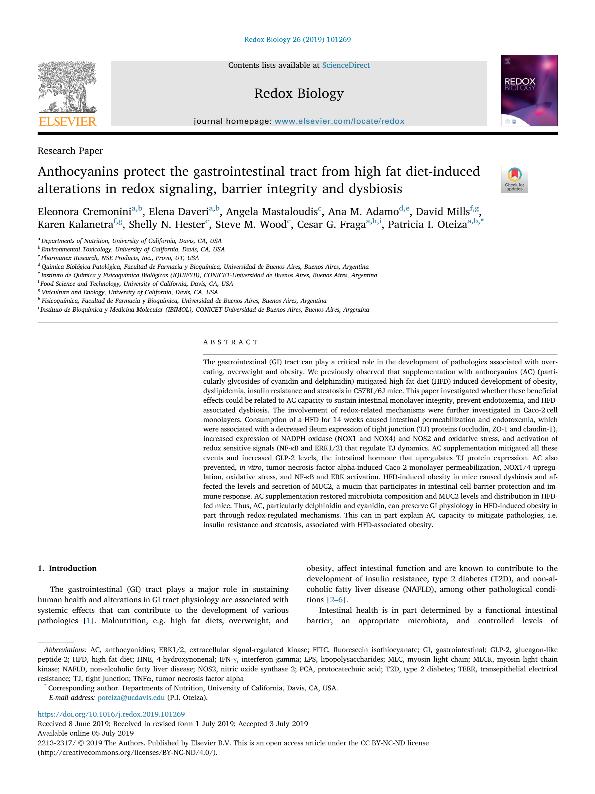Artículo
Anthocyanins protect the gastrointestinal tract from high fat diet-induced alterations in redox signaling, barrier integrity and dysbiosis
Cremonini, Eleonora; Daveri, Elena; Mastaloudis, Angela; Adamo, Ana María ; Mills, David; Kalanetra, Karen; Hester, Shelly; Wood, Steve M.; Fraga, César Guillermo
; Mills, David; Kalanetra, Karen; Hester, Shelly; Wood, Steve M.; Fraga, César Guillermo ; Oteiza, Patricia Isabel
; Oteiza, Patricia Isabel
 ; Mills, David; Kalanetra, Karen; Hester, Shelly; Wood, Steve M.; Fraga, César Guillermo
; Mills, David; Kalanetra, Karen; Hester, Shelly; Wood, Steve M.; Fraga, César Guillermo ; Oteiza, Patricia Isabel
; Oteiza, Patricia Isabel
Fecha de publicación:
09/2019
Editorial:
Elsevier
Revista:
Redox Biology
ISSN:
2213-2317
Idioma:
Inglés
Tipo de recurso:
Artículo publicado
Clasificación temática:
Resumen
The gastrointestinal (GI) tract can play a critical role in the development of pathologies associated with overeating, overweight and obesity. We previously observed that supplementation with anthocyanins (AC) (particularly glycosides of cyanidin and delphinidin) mitigated high fat diet (HFD)-induced development of obesity, dyslipidemia, insulin resistance and steatosis in C57BL/6J mice. This paper investigated whether these beneficial effects could be related to AC capacity to sustain intestinal monolayer integrity, prevent endotoxemia, and HFD-associated dysbiosis. The involvement of redox-related mechanisms were further investigated in Caco-2 cell monolayers. Consumption of a HFD for 14 weeks caused intestinal permeabilization and endotoxemia, which were associated with a decreased ileum expression of tight junction (TJ) proteins (occludin, ZO-1 and claudin-1), increased expression of NADPH oxidase (NOX1 and NOX4) and NOS2 and oxidative stress, and activation of redox sensitive signals (NF-κB and ERK1/2) that regulate TJ dynamics. AC supplementation mitigated all these events and increased GLP-2 levels, the intestinal hormone that upregulates TJ protein expression. AC also prevented, in vitro, tumor necrosis factor alpha-induced Caco-2 monolayer permeabilization, NOX1/4 upregulation, oxidative stress, and NF-κB and ERK activation. HFD-induced obesity in mice caused dysbiosis and affected the levels and secretion of MUC2, a mucin that participates in intestinal cell barrier protection and immune response. AC supplementation restored microbiota composition and MUC2 levels and distribution in HFD-fed mice. Thus, AC, particularly delphinidin and cyanidin, can preserve GI physiology in HFD-induced obesity in part through redox-regulated mechanisms. This can in part explain AC capacity to mitigate pathologies, i.e. insulin resistance and steatosis, associated with HFD-associated obesity.
Palabras clave:
FLAVONOIDS
,
OBESITY
,
INTESTINE
,
INFLAMMATION
Archivos asociados
Licencia
Identificadores
Colecciones
Articulos(IBIMOL)
Articulos de INSTITUTO DE BIOQUIMICA Y MEDICINA MOLECULAR
Articulos de INSTITUTO DE BIOQUIMICA Y MEDICINA MOLECULAR
Articulos(IQUIFIB)
Articulos de INST.DE QUIMICA Y FISICO-QUIMICA BIOLOGICAS "PROF. ALEJANDRO C. PALADINI"
Articulos de INST.DE QUIMICA Y FISICO-QUIMICA BIOLOGICAS "PROF. ALEJANDRO C. PALADINI"
Citación
Cremonini, Eleonora; Daveri, Elena; Mastaloudis, Angela; Adamo, Ana María; Mills, David; et al.; Anthocyanins protect the gastrointestinal tract from high fat diet-induced alterations in redox signaling, barrier integrity and dysbiosis; Elsevier; Redox Biology; 26; 9-2019; 1-10
Compartir
Altmétricas



